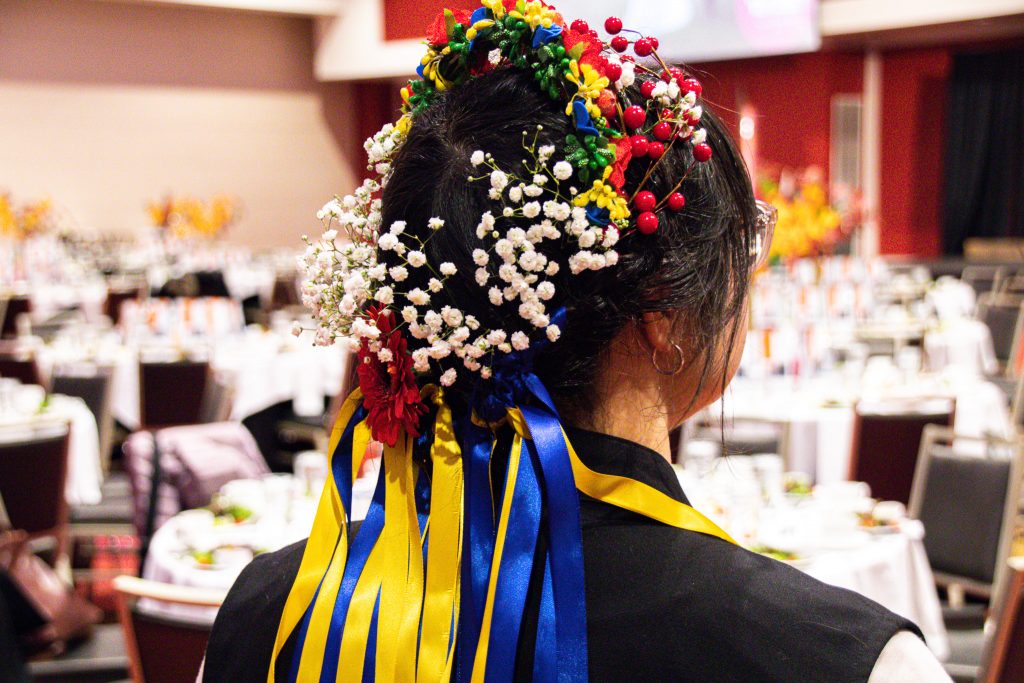Blog
This Year’s Volunteer Spotlights
Next week is Volunteer Appreciation Week, and we want to celebrate our amazing volunteers. Volunteers are more than just helpers — they’re catalysts for change. Every act of service, no matter how small, has a meaningful impact in the lives of those we serve. Our volunteers are the backbone of our work, helping us serve vulnerable communities around the Quad Cities.
Their dedication and generosity make a real difference in our families’ lives. We couldn’t do what we do without volunteers like Matthew and Autumn.
Matthew
Matthew heard about World Relief Quad Cities through various media sources.

He deployed to Afghanistan in 2011 but never directly interacted with the local population. After the Taliban took control of Afghanistan in 2021, Matthew knew he wanted to get involved.
He supports helping all refugees, but because of his time overseas, he was especially interested in helping Afghan refugees.
“Volunteering through World Relief Quad Cities was a way to have more direct engagement with the Afghan people,” he said.
Matthew said volunteering has changed him because he can see the results. He knows exactly how his contribution helped the refugees because he “met the people directly.”
One of his favorite memories of volunteering is helping families complete their asylum interviews in Chicago. He remembers how excited they were during the trip.
He recalled some sharing traditional Afghan food while others took photos of the tall buildings in the city. “A woman who knew little English suddenly exclaimed ‘I love Chicago!’,” he said.
Initially, Matthew’s biggest concern was the language barrier. And although language may be a challenge, he learned that many of those he worked with were very tech savvy and have great learning capacity themselves. He said that many seem “grateful to be here.”
Autumn
Autumn has volunteered at World Relief Quad Cities for about 8 years. She first heard about volunteer opportunities from the volunteer coordinator at the time, Kelly, when she spoke at the Quad Cities Prayer Center. She started volunteering soon after.
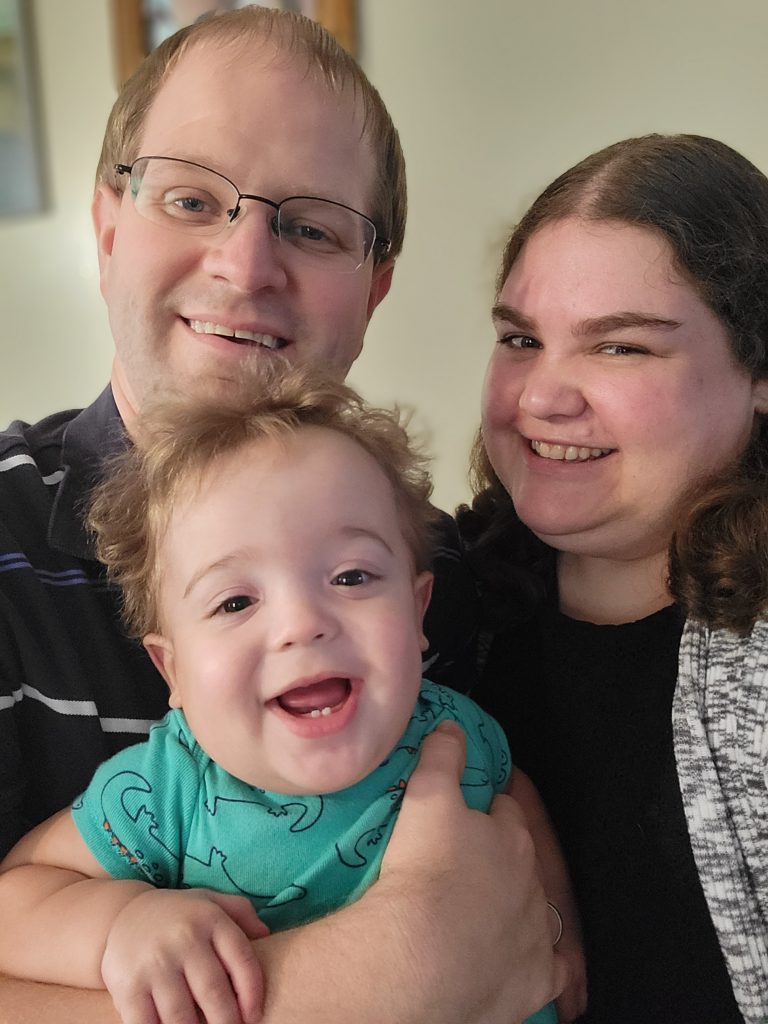
She suddenly found herself with “a lot more free time” when her life situation changed.
When she heard about the opportunity to help refugees in ways that fit her talents and interests, she knew that volunteering would be an impactful use of her time.
Autumn has gained many insights during her years of volunteering.
“I have learned new perspectives and experiences from the many different cultures I’ve worked with over the years. It’s given me more courage to seek out people who are different from me and learn their holidays, customs, foods, and celebrations,” she said.
She became particularly close with two families. She has many fond memories with them, but the best was hearing their joy as they got their U.S. citizenship.
“Seeing where they started in the U.S. to where they were headed was so amazing,” Autumn said.
She’s also learned to trust in others and ask for help when life gets hard. “We aren’t created to go through all of life’s struggles alone,” she ended.
Read the rest of Autumn’s story here.
To Matthew, Autumn, and every volunteer who has dedicated their time to serving the vulnerable: Thank you for choosing to walk alongside our families. Happy Volunteer Appreciation Week from all of us at World Relief Quad Cities!
Learn more about opportunities to volunteer with refugees and other immigrants, or, fill out a volunteer application:

Erica Parrigin manages grant writing and communications at World Relief Quad Cities. She graduated from Western Illinois University with a BA in English during the pandemic in 2020. She believes that stories are powerful, and that finding ways to empathize with others is the first step in making a difference.
What is Resettlement
The Joys and the Challenges.
“The most rewarding part of being a case manager at World Relief is watching the face of a family member reuniting with a loved one — where their whole face demonstrates joy and they embrace each other, having not known for sure whether they would ever be given this chance” – Isabella, Resettlement case manager.
“Of course, like every job, there are challenges — lots of unexpected urgencies and needs to be met. For example, a family’s utilities not working and vehicles breaking down on their way to a doctor’s appointment. In every way, the job requires a heart full of compassion and willing hands and feet to work.”
Staff in the Resettlement department at World Relief list lots of rewards: airport arrivals, family reunifications, citizenship ceremonies, first glimpses of snow, clients receiving much-needed medical care after months/years of waiting, high school and college graduations, friendships forged between people from different parts of the world who seem like they never should have met.
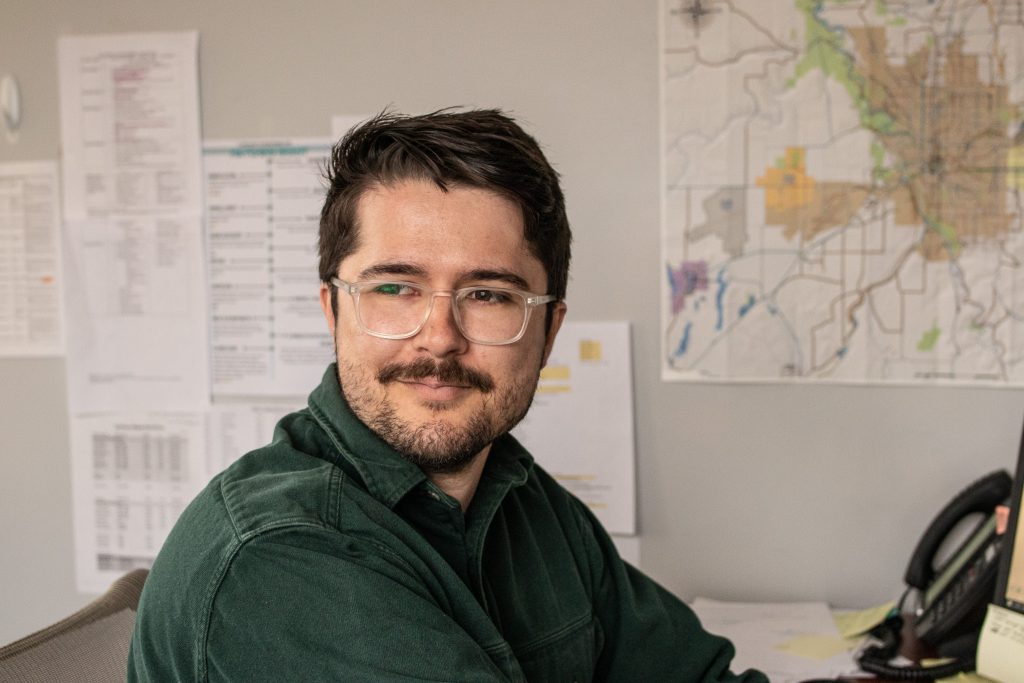
“The work that is done in the Resettlement department is very human,” said Gio, Resettlement Program Manager. “It is done by humans for humans. This human aspect is essential to our jobs and something we highly value. It’s why we are here.”
What can sometimes be missed, however, is the hard work behind the rewards.
“Alongside this very human work is a complex process of documents, contract-regulated timelines, etc. Combine this with the fact that no person’s/family’s needs are ever the same and the local environment in which we work is always changing (think housing, jobs, policies) and a complex process becomes even more complex. Because of this challenging environment, we need the help of the community in Spokane. We need volunteers, landlords, service providers and the community at large to come together to make this happen.”
The work of welcoming people is a community effort. (Repeat those last two words with emphasis: Community. Effort.)
“I would say this work is harder than people realize and better and more rewarding than people realize” – Jordan Bemis, Resettlement Director.
Jordan has been working at World Relief for 12 years, first as an intern, then as a case manager, a pre-arrival coordinator, a program manager, and now as Director of Resettlement and Placement. “The planning, the details, just the amount of work that goes into resettling one family is enormous.”
Pre-Arrival
The work of World Relief Spokane begins with resettlement. Eugenia, WR Spokane pre-arrival coordinator, is notified a few weeks before families arrive. She receives the airport arrival info, the number and ages of people in each family, where they are coming from and whether they have any US ties in the area. She arranges for them to be met upon arrival and transported to their temporary accommodations, which can vary widely – a church basement, an Airbnb, a host home. If the ethnic community has a presence in Spokane, they may be part of the welcome and provide an initial, culturally appropriate meal.
Anzhella, the initial healthcare coordinator, is also working behind the scenes prior to the family’s arrival. She reads the family’s medical records, researches their needs, sets up refugee health screenings, and coordinates healthcare providers for a smooth transition into the US healthcare system. For pregnant women and moms with young children, she makes sure they get set up with WIC. And for elderly patients, she helps them apply for SSI.
“I want to be prepared ahead of time so that families receive the care they desperately need right away.”
Early Days
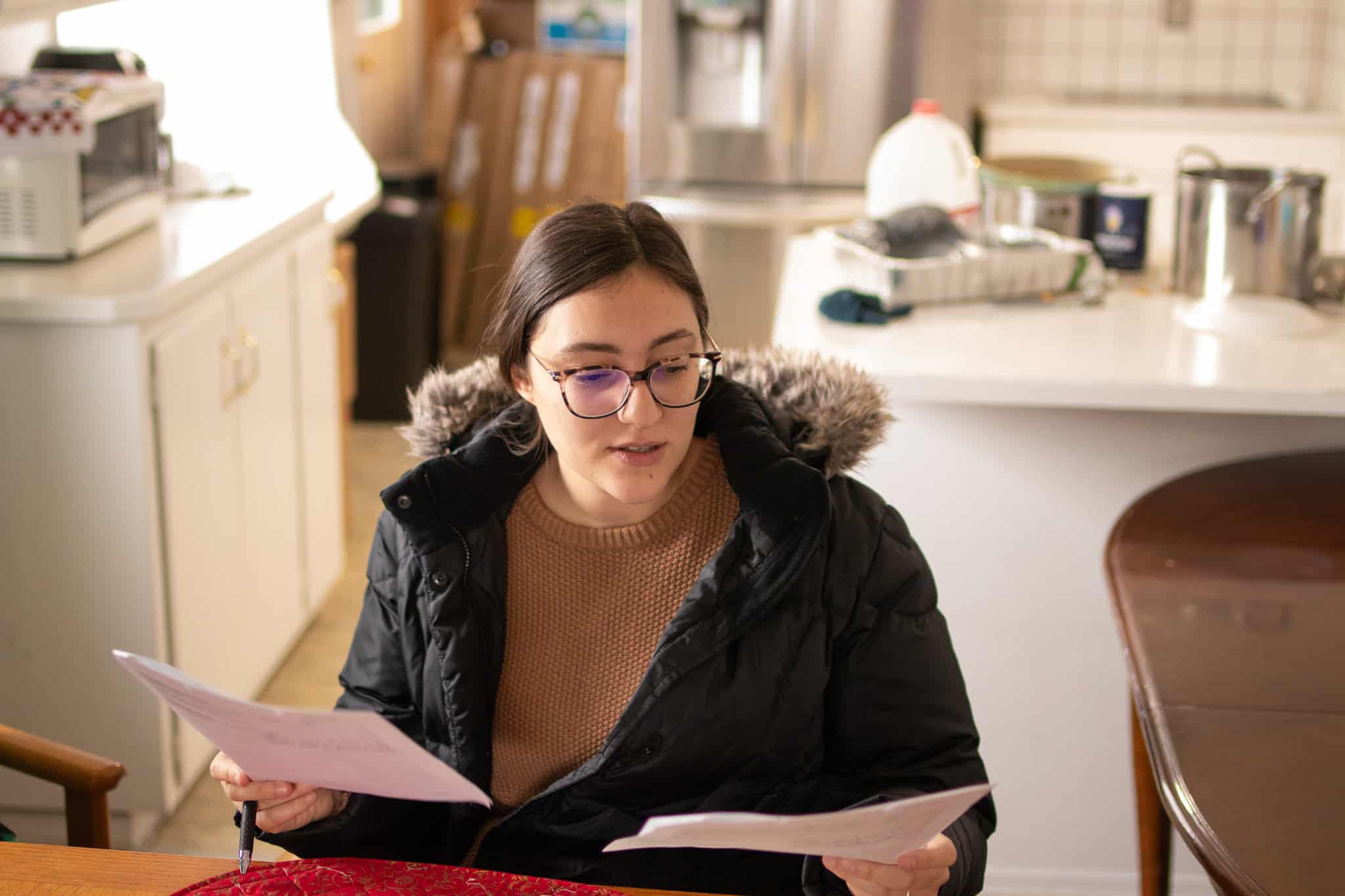
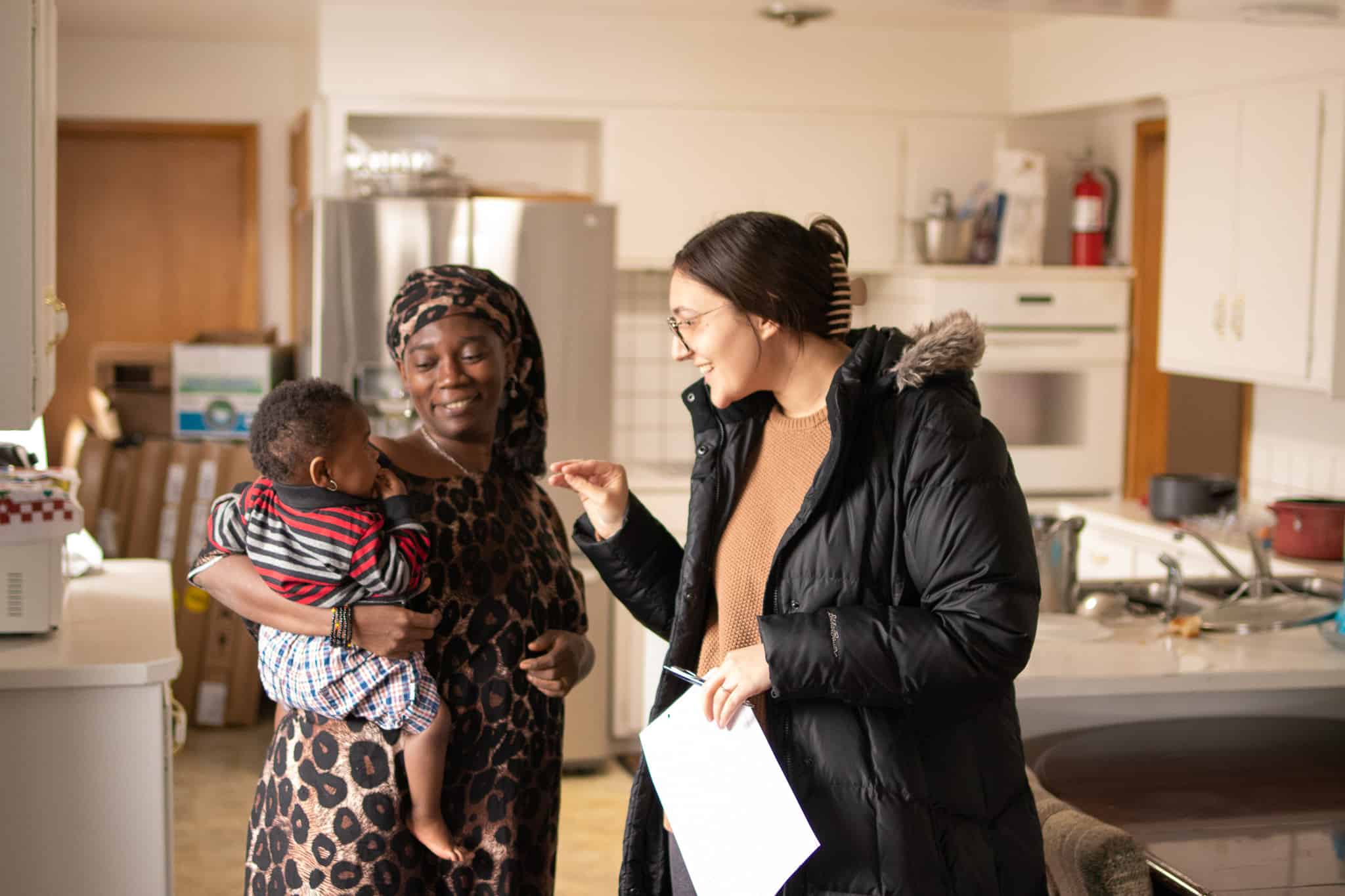
The day after arrival, a case manager visits the family in their temporary home to welcome them and begin the process of establishing roots in Spokane. The case manager explains World Relief’s role and asks questions to better understand the family’s situation and goals. The WR team provide groceries for their first few days and identifies a nearby grocery store for future shopping. Paperwork is signed and next steps identified.
Within the first week, the family comes to the World Relief office for a cultural orientation or, when appropriate, to be interviewed for enrollment in Match Grant. Match Grant is an accelerated option for families with limited barriers to employment and an eagerness to work.
Cultural orientation is meant to give the family a picture of life in Spokane and how it may differ from their previous life. World Relief staff and volunteers teach families about basic laws, resources and benefits, how to use public transportation, health and medical services, family reunification options and more.
Expectations
Part of cultural orientation is also about setting realistic expectations – on both sides. What can the clients realistically expect and what will the landlords and employers they meet be expecting?
Jordan said, “Rumors about the US abound overseas. Refugees hear that everything will be provided for them when they arrive. They will receive a house, a car, they won’t have to work or they will be given the exact same job that they did back home. The reality is that they will have to work really hard, their first living arrangement will be really basic, and they won’t have much choice of where it is.
“We try to frame these conversations by talking about how this is just a starter home, or they just need a starter job to survive. You can literally see on their faces when culture shock sets in, that this isn’t like what they were expecting.
“As a staff, we have to remember that every refugee has experienced trauma; through fleeing their country and their individual experiences. Some respond to these new situations out of frustration and can be pretty thankless. But no one on our staff took this job to be thanked. We took this job because we know welcoming the stranger is the right thing to do. It is an act of justice and of mercy.”
Getting Settled
Eugenia works closely with Erika, WR housing coordinator, to determine when a family will be able to move from temporary to permanent housing. Erika works with landlords to find permanent housing for our families. She may have to call 50 different landlords to arrange for four viewings, and from there, she may or may not locate an appropriate rental.
“About ten percent of the landlords respond to my inquiries, and only about two percent of the contacts end up being a successful resource. Refugees don’t have Social Security numbers when they arrive. They don’t have work authorization for the first 6 weeks. They don’t have a credit score, co-signers or a driver’s license – all of those are vital when applying for housing.”
Jordan says finding housing is the single most difficult part of Resettlement.
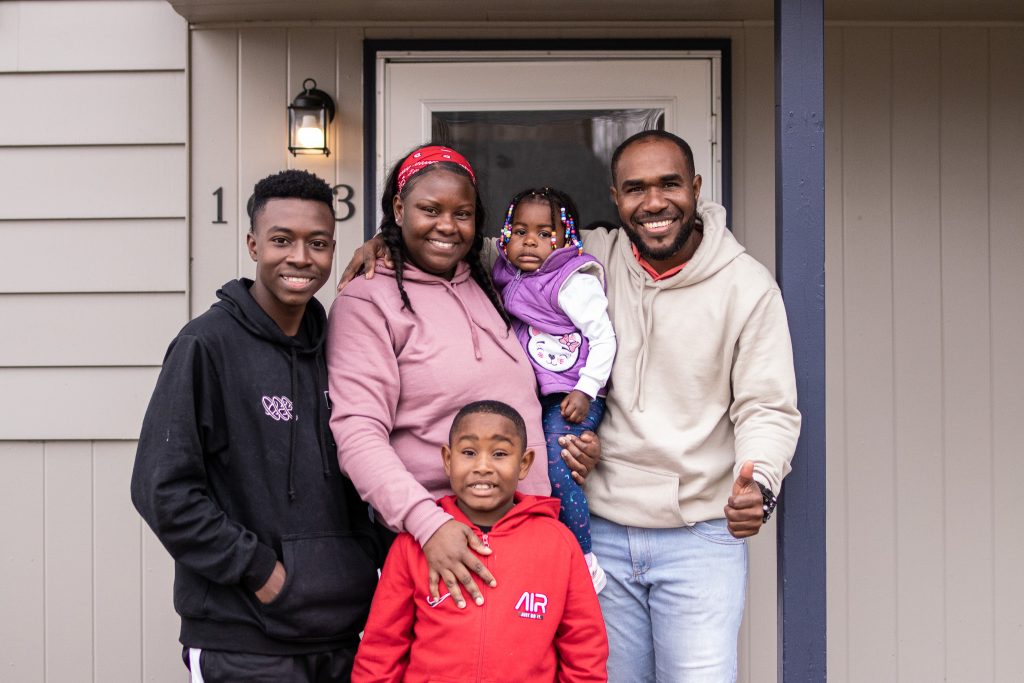
The current rental vacancy in Spokane is about 4.7 percent, up from a few months ago, but still tight.
“Just finding available housing is difficult,” Jordan said, “and then to find landlords willing to rent to refugees who don’t have a job yet and no rental history here. It is a bit of a leap of faith on the landlord’s part, and mostly, it is done because we have built relationships over the years with them.
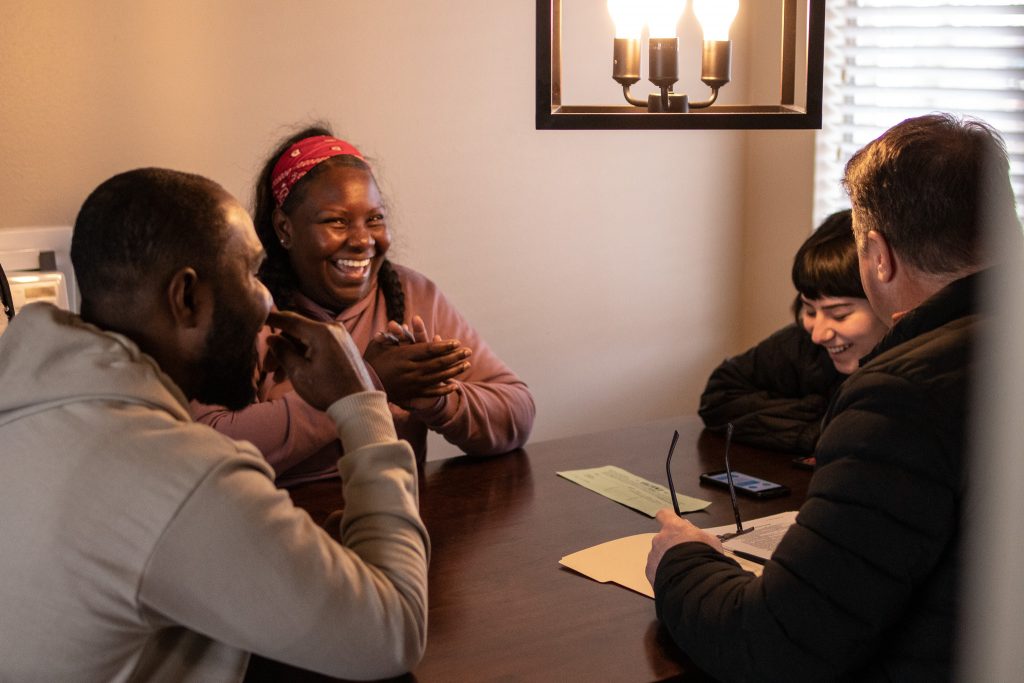
“Ongoing housing has definite challenges. We have refugees coming from dozens of different countries and cultures, and each family is different in terms of their experience with housing and the amenities they have had. We have families who speak amazing English when they arrive and who have lived in better homes than I have. They already know how to use all of the appliances. Then, we have families who have been stuck in a refugee camp for possibly decades, and we have to start from the beginning: how to use a key, how to use the stove, how to store food properly, how to keep water in the tub by using a shower curtain, and how to flush toilet paper and plunge a toilet. This family also may not speak English, but they may speak like five other languages.”
90 Days
Resettlement is all about the first 90 days – getting a family settled and off to a promising start.
“Case managers teach them how to pay their rent, help them understand how to budget, how to get a check or money order and how to send mail. I have demonstrated many times how to lick an envelope. All of this takes time and each family is different in how quickly they pick things up.”
Case managers in Resettlement also connect clients with specialists in the Economic Empowerment when they need assistance in finding jobs or with case managers in Intensive Case Management for those who need longer term assistance because of additional barriers.
End Results
After 12 years, Jordan perhaps sees the big picture clearer than anyone: “I get to tell people about the best parts of my job, like going to the airport for a family reunification case where a mom has been separated from her daughter for 12 years or a spouse has been separated from her husband for seven years. Many, many smiles and tears.
“I absolutely love enrolling kids in school and taking them to their school to take a tour and meet their teachers and show them how to take the bus the next day. They are shy and nervous and excited and full of thoughts. It’s one of the moments that you see these newcomers start to dream about what a future looks like and what is possible. For many of them, they have been stuck for years with no home and no hope. Resettling to the United States, though it is hard, allows them to dream again.
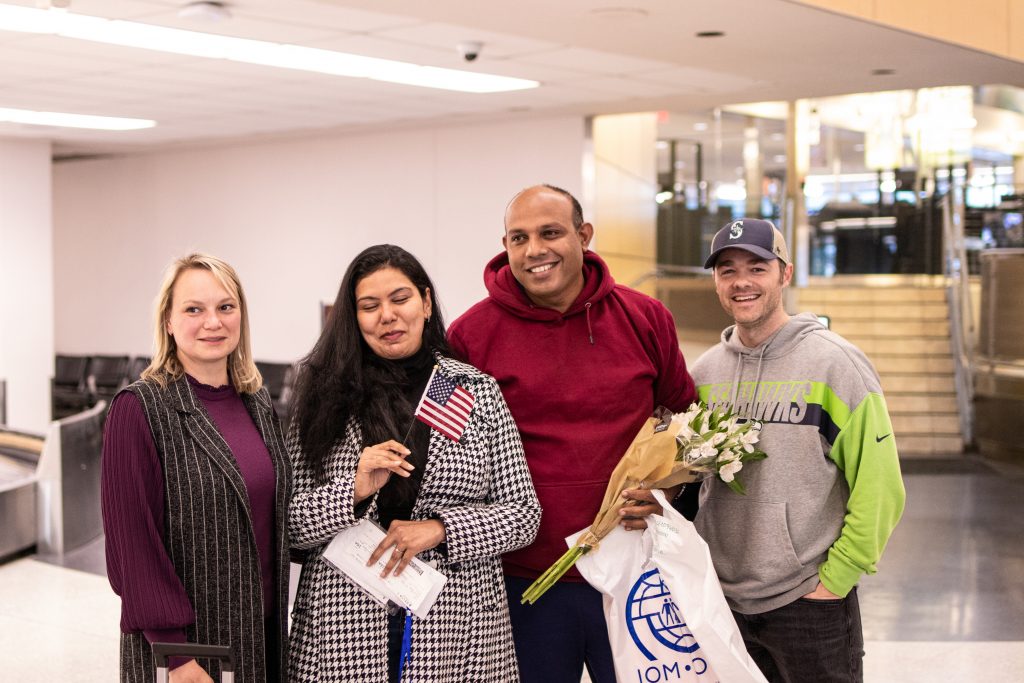
“And the other best part, since I’ve worked here so long, is being able to see the results of the hard work these families put in – the dream jobs they now how, the businesses they’ve started, the kids who’ve graduated college and have their dream jobs and are getting married, the many refugees who have gone through the naturalization process and become citizens. There is something pretty great when you stick around a place for so long and you are able to see all of these families succeed and flourish and become members of the community.”
Want to be part of this welcoming community?
We need you! We need financial partners, volunteers, and people to donate cleaning supplies, hygiene items and gently used furniture. Find out more on our website.
Building a Cross-Cultural Relationship as a Volunteer
Whether you’re a seasoned volunteer or just starting out, Whitney Renfroe agrees that uncertainty can often accompany a cross-cultural relationship. After all, Whitney is no stranger to helping immigrants.
During her college years, this occupational therapist spent a summer month in Greece serving and walking alongside refugees. And it’s the passion that brought her to the Chicagoland area. Being closer to a larger immigrant population meant more opportunities to build meaningful relationships.
As Whitney shares about her friendship with Afghan Paralympian, Farzana, she addresses several uncertainties that often crop up as a cross-cultural volunteer. Following are a few insights to help you get past some of your own doubts and move you closer to building a relationship that can change your life.
God will use you exactly where he needs you. Even if it takes you a little longer to get there.
A simple invitation over a cup of coffee brought Whitney to World Relief Chicagoland in August 2021. Her meeting with an acquaintance who belonged to a church that was a World Relief partner opened her eyes to a new opportunity. They needed volunteers to walk alongside Afghan refugees arriving in the United States.
Whitney logged on to the application, eager to get started. But instead of volunteering, she found herself waiting.
Good timing has a reason.
Coming off the cusp of the Covid shutdown, many non-profit organizations were navigating the sudden broad changes in society – and World Relief Chicagoland was no exception. Volunteer opportunities came Whitney’s way, like setting up an apartment, but the timing didn’t work with her schedule.
As weeks passed by with still no fit, Whitney remained patient but held some doubts. Was this going to happen? Then came the call from World Relief about a role she hadn’t heard of.
“They were pretty open like ‘We recognize you’ve been waiting a really long time to be matched with someone. And we’re sorry it’s been so wild. But we’re wondering if you’d be interested specifically in being a health advocate?’”
A new individual had arrived at the Chicago office. A single Afghan woman who was close to Whitney’s age had a disability that required an extra level of healthcare support. With Whitney’s medical background to help navigate the American healthcare system, Farzana and Whitney were a perfect fit.
Whitney was impressed by the degree of thoughtfulness that World Relief had put into selecting her partner. “They didn’t want it to be just a random, ‘Let’s throw these people together.’ When I realized that, it made me appreciate the amount of time.”
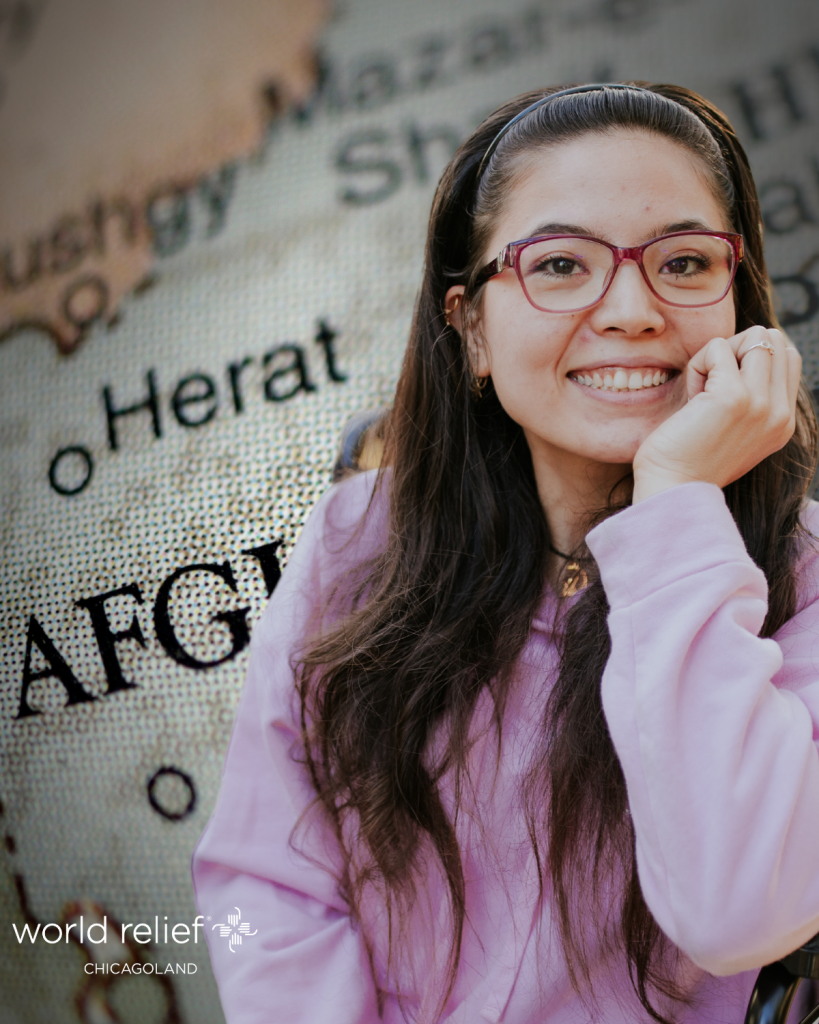
Don’t hold onto assumptions. Someone will always turn them upside down.
“She has taught me a lot about not assuming. Farzana is one of the most go-getting women I’ve ever met in my life.”
Whitney Renfroe
Whitney recognizes how easy it is in our Western culture to draw conclusions or build stereotypes about other cultures based on what’s portrayed in various news and media outlets. But when you take the time to get to know someone, it’s amazing how these portrayals are quickly shattered.
And being a volunteer enables you to experience it.
As Whitney grew closer to Farzana, she found an incredibly educated, resilient, and independent woman who for all practical purposes amplified the American dream. Farzana eagerly grabbed hold of every opportunity given to her. She went from speaking little English to growing exponentially in her usage of it. She began working a job and attending school. And she continued to pursue her passion by getting back onto the basketball courts.
In fact, the nature of their relationship wasn’t exactly how Whitney envisioned it either.
Whitney’s plan was to be a valuable resource for Farzana. Although she took Farzana to her doctor appointments and helped out where needed, much of their time was spent in a different way. “The majority of the time I think was honestly Farzana showing hospitality to me.”
When Whitney came to visit, Farzana was intentional about making her a cup of coffee and spending their time together talking and practicing English. To Farzana, this is where the value lay.
The small things carry weight. Sometimes more than the bigger ones.
Time and location didn’t always make it convenient for Whitney and Farzana to meet regularly. And often it’s this concern that can prevent someone from taking on the role of a friendship partner, health advocate, or youth tutor.
But when they couldn’t meet, Whitney found a number of other things that were just as meaningful. Weekly check-ins were made using WhatsApp, voice messages, or video calls to see how Farzana was doing and to let her know, “Hey . . . I was thinking about you.”
“I think those weekly quick check-ins were really important. It was something small and it didn’t always feel sufficient to me. But that doesn’t mean that there wasn’t a connection made even in those things.”
And with World Relief’s staff partnering with her, Whitney understood she was one piece of a bigger puzzle to help Farzana rebuild her life. “That took a lot of pressure off of me in terms of not feeling like I had to carry the weight of the whole thing. My job was to show up and to be there – to be a resource.”
Addressing the Awkwardness
What about the awkwardness that often accompanies the language barrier in cross-cultural relationships?
Whitney assures others it’s okay to feel awkward. In fact, count on feeling awkward because it will happen. But given what it took for that person to get here, “The least I can do is meet them in the awkward.”
In the meantime, as Farzana learned English, Whitney fell back on nonverbal communication and other small expressions. “You can make a connection without even having words, too. People appreciate a smile, kind gestures like little gifts.”
Sometimes it’s about letting whatever needs to happen in that space, happen.
Being the Bridge
Ultimately, Whitney believes that what it takes to build a cross-cultural relationship is what she strives to be for Farzana. A friend who serves as a bridge between two cultures.
“I would say the reality is, a lot of people come to this country and wonder, ‘Am I going to be accepted? Am I going to make friends? Am I ever going to learn English?’ I think having someone who regularly shows up . . . and just be a kind presence goes a really long way.”
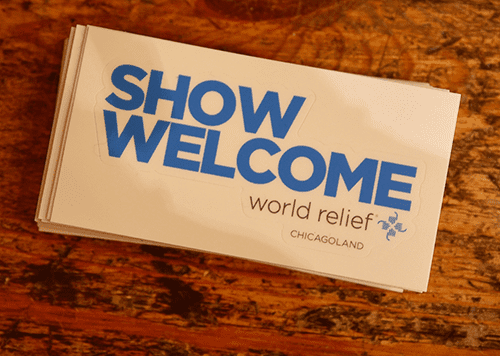
With a higher number of immigrants and refugees arriving in the United States, World Relief Chicagoland needs more volunteers to walk alongside them. Unfortunately, for nonprofits across the nation, volunteering rates have been decreasing. You can be part of the solution — whether it’s becoming a friendship partner, tutoring a young student, or driving someone to a job orientation — there’s a volunteer opportunity to fit your interests and lifestyle. Find the part you play today!
Where can you serve as a volunteer this summer?
Become a Youth Tutor: Read How to Have Impact as a Volunteer Tutor
Serve in a Youth Club or Summer Camp: Read Summer Camp: Fun, Fellowship and First Responders
Interview with Office Director: Tami McLaughlin
How did you start working at World Relief?
I was the director of missions at a local church outside of Atlanta and we partnered with World Relief for a short-term mission trip. We went to Clarkston, Georgia, and I think it has the largest number of languages spoken in one square miles in the United States; it was a community that was refugee-based. That was my introduction to World Relief, and when I was looking for a new job I actually applied to World Relief four times. I started out as an employment specialist in Atlanta, and one day my boss walked into my office and said ‘I think you’re from Wisconsin, and we have a position open in Wisconsin.
How do the teachings of Jesus Christ impact what you do at World Relief?
Jesus loves the vulnerable. I think in the Old Testament the words ‘refugee’ and ‘sojourner’ are mentioned over 20 times. I think these people and this work is really dear to God’s heart, and I feel the presence of God has been so evident in so many situations that I’ve been in because of how important this work is to him. Jesus loves, Jesus is involved, Jesus’s presence is present.
What is the biggest cultural difference that you’ve experienced when working with refugees?
When I first started working at World Relief, I was working with three sisters. We’re trying to find a job for them, and two of the sisters got jobs at a chicken factory. The third sister wasn’t strong enough to do the work in the factory. A couple of weeks later, I got a call from the human resource department at the chicken factory and they said ‘You need to tell your clients that if they can’t come to work they can’t send their sister to work in their place.’ To me, it was common sense that you can’t send someone else to work for you, but for them it wasn’t. That was a learning experience for me, how we should evaluate some of the things we do in our own culture.
What should the residents of the Fox Cities know about their refugee neighbors or how they can support them?
They should know that their refugee neighbors will deeply enrich their lives by bringing in a different culture. Different cultures are something that we all could learn from and that would enrich our lives if we took the time to learn about them. I think it is sometimes assumed that when people have a different language or different skills, that they’re not as strong or have as much to contribute to our community. Refugees are people who’ve survived and persevered through really difficult situations, but their circumstances shouldn’t define them. They are very resilient people who have survived so much, and when they’re here they can start thriving beyond any circumstance they’ve had to face.
The Women’s Programs: A Special Feature
World Relief Sacramento wishes to feature our Women’s Programs – a set of services offered to new female refugees from Afghanistan. The Women’s Programs are dedicated to empowering their clients through education, as well as integration with the Sacramento community.
In 2019, a group of Afghan women started meeting in a Sacramento apartment. Converted by World Relief into a community center, the apartment was a place for the women – all of them refugees – to make friends with others who’d experienced persecution in war-torn Afghanistan. To relax, the women cooked meals, made art and shared their stories. However, as they got to know one another, they realized: As new arrivals in the U.S., they faced similar barriers. Whether it was learning English, adapting to technology or integrating with American culture, there were few to no programs that catered to their unique needs.
The women discussed their concerns with World Relief staffer Krislyn Adkinson. In response, Krislyn and other members of our Education Department brainstormed ways we could help. The solution: our Women’s Programs. The women in the apartment became our first clients.
The Women’s Programs are designed specifically with our clients in mind. As Krislyn explains: “[Back in Afghanistan], many of these women never got any education, or only went to school for three or four years. Whether due to cultural reasons, their gender or because of poverty…The community colleges around here, or other adult education classes, assume the student has already had years of basic schooling. Many of [the women] aren’t ready for that, so we meet them [where they are].”
The popularity of the Women’s Programs is a testament to the need for it. Krislyn and her department are now in their fifth year running the programs. Since 2019, they’ve trained over 200 Afghan women, ranging from young mothers to elderly matriarchs. Their current cohort alone has another 100 clients enrolled. Many more sit on the waitlist.
“Our mission is to empower the women,” Krislyn says. “To combat their isolation, to transition them into self-sufficiency and to give them a confidence boost.” To achieve this, the Women’s Programs host virtual classes to teach the most important topics: English as a Second Language (ESL), U.S. laws and women’s rights, basic math and financial management, food and water safety, vehicle safety, technology use, and how to handle common situations like calling 9-1-1, requesting a translator or enrolling their child in school. There’s also a Driver’s Education program, where clients prepare for their driver’s permit and receive free behind-the-wheels training. Throughout all this, the women are taught directly by multilingual Afghan caseworkers, who then translate for English-speaking staff like Krislyn.
“Our mission is to empower the women…To combat their isolation, to transition them into self-sufficiency and to give them a confidence boost.”
Krislyn Adkinson, Women’s Programs coordinator
Zohra Obaidy is one such caseworker. As a former refugee, she understands what kinds of barriers her students face. At the same time, she’s in the perfect position to help: Zohra is fluent in both Pashto and Dari – the two official languages of Afghanistan – as well as English. She’s seen firsthand how the Women’s Programs empower a person.
“[My clients start as] high-need, rural women,” Zohra explains. “Some are married and have eight or nine children to take care of…I remember, one client covered her face not just in front of men, but also other women. Another client had never touched a phone or computer before [the class]. She said, ‘This is my first phone in my life.’”
Even the most basic knowledge the women gain can transform their life. Zohra gives one example with a client (kept anonymous for privacy): “[At first], she didn’t have the courage to make a doctor’s appointment by herself. Then, later, she told me, not only did she make an appointment, but then the translator [they brought in] wasn’t translating properly. She remembered what she learned in class, and told him, ‘No, this is not what I said.’ She corrected him and advocated for herself.”
Hannah Pierce, an administrative coordinator, reports the same. Though she doesn’t speak Pashto or Dari, she’s also noticed how the women transform. “We had one woman start off not knowing how to count money,” Hannah says. “When she went to the grocery store, she’d put the money on the counter and wait for the cashier to count for her…But after, she knew how to ask for help, and how to count on her own.”
Hannah and Krislyn also note the women’s dedication to their own growth. They’ve both seen clients go to extraordinary lengths to attend class. In one instance, a woman’s daughter fell sick. She chose to log into class from the hospital parking lot. Other women have shown up just a few days after giving birth – even though Afghan culture encourages them to take 40 days of rest.
“We’re like, ‘No, stay home!’” Hannah says. “But they want to learn. It’s amazing…they don’t want to miss class for anything.”

Was Jesus a Refugee?
“Jesus Was a Refugee.” Recently, I’ve seen that message all over — on billboards, TV ads, on t-shirts, debated on social media and beyond. Much of this messaging is part of a broader campaign called He Gets Us that aims to help people recognize that Jesus was a human being who can identify with us in our humanity.
That’s a powerful reality for the more than 32 million refugees in our world today, a number unprecedented in recorded history. Jesus “gets” them because, early in his human experience, the Gospel of Matthew tells us that he was forced to flee the threat of Herod’s persecution. He was carried by Joseph and Mary to Egypt, beyond Herod’s dominion, where they would be safe from the genocide inflicted by a jealous ruler on the little boys of Bethlehem.
Many of today’s 32 million refugees know viscerally what it means to awaken in the middle of the night and to flee with what little they could carry, as an angel instructed Joseph to do. To feel danger just behind them. To complete a grueling journey only to arrive in a new land and a new culture with the ongoing grief of the loss of one’s homeland. Jesus presumably lived all of that in his fully human flesh as a small child. And millions today find solace in that reality. He gets them.
But was Jesus really a refugee?
We now have formal legal definitions for the term “refugee” in both U.S. and international law: refugees are those outside of their countries of origin who are unable or unwilling to return because of a well-founded fear of persecution on account of their race, religion, political opinion, nationality or membership in a particular social group. But, of course, these definitions did not exist when the holy family made their journey.
Some, especially on social media, have vehemently insisted that Jesus was not a refugee — perhaps defensive at the implication that their preferred refugee and immigration policies to keep most, if not all, refugees out might actually have harmed the incarnate God.
But while it is clear from the biblical text that Jesus was displaced by a credible threat of persecution, it’s fair to ask just how he would fare under our contemporary policies — as theologian Glenn Butner Jr. does in a new book, Jesus the Refugee: Ancient Injustice and Modern Solidarity.
Butner argues that Jesus largely satisfies the contemporary legal definition of a refugee, but it’s debatable whether the journey to Egypt took him “outside of his country of origin,” since Egypt and Bethlehem were both part of the Roman Empire. Perhaps it’s more precise to characterize the holy family as “Internally Displaced Persons” — those, including more than 60 million people in our world today, who have been forced to flee their homes but remain within the boundaries of their countries.
Would Jesus have faced the barriers many families fleeing persecution face today?
Perhaps Jesus was actually an asylum seeker: asylum seekers profess to meet the definition of a refugee. They say that they’re afraid of persecution on account of one of the enumerated grounds — but they’re not ensured protection under the law unless and until they have demonstrated (to the satisfaction of the governing authorities of the country where they hope to find refuge) that they indeed qualify. Sometimes they lack documentary evidence of the credibility of their fear. Would Joseph have cited an angelic message as his evidence that persecution was likely for little boys in Bethlehem? Would that have satisfied an Egyptian immigration judge?
Fortunately for our Lord and Savior and his earthly parents, there’s no evidence in the biblical text that they faced any barriers to finding refuge in Egypt. But the Gospel of Matthew gives us very few details about their experience there. We’re left to speculate: were they welcomed, seen as a potential threat or simply ignored? Did Jesus learn to speak his first words with a different accent than his parents? Did Joseph easily find work, or was he told that he would be “stealing” a job from an Egyptian carpenter?
Decades later, in one of his final sermons before his crucifixion, Jesus commends certain individuals for having welcomed him when he was a stranger. The disciples are confused: “When did we see you a stranger and invite you in, or needing clothes and clothe you?” (Matthew 25:38). They did so, Jesus says, when they welcomed one of “the least of these brothers and sisters of mine” (Matthew 25:40). Jesus identifies himself perpetually with the vulnerable and the stranger — which, at least early in his life, he himself was.
Does Jesus’ story shape how we respond to refugees and other immigrants?
Whether Jesus would satisfy the precise legal definition of a refugee or not, what’s clear for those of us who profess to follow him today is that an unprecedented crisis of forced migration — with more than 100 million people forced from their homes, experiencing displacement similar to what Jesus experienced as a child — presents an unprecedented opportunity to demonstrate love for Jesus himself.
At World Relief, it’s our great privilege to partner with local churches both across the United States and in various other parts of the world to welcome and care for refugees and others who have been displaced. From our U.S. refugee resettlement program’s foundations in the 1970s, we — and the tens of thousands of church-based volunteers who have partnered with us — have resettled more than 300,000 individuals, motivated by Jesus’ challenging words in Matthew 25. As Evelyn Mangham, the cofounder of World Relief’s refugee resettlement program said, the Christian response to an unprecedented global refugee crisis is “simple”:
“Respond to what Jesus said, that’s all: ‘I was hungry, and you gave me something to eat. I was thirsty and you gave me something to drink. I was a stranger’ — refugee — ‘and you took me in… Inasmuch as you did unto of the least of these my brethren, you did unto me.’ It’s simple obedience.”
Find out how World Relief is advocating for and welcoming refugees and other vulnerable immigrants.

Myal Greene has a deep desire to see churches worldwide equipped, empowered, and engaged in meeting the needs of vulnerable families in their communities. In 2021, he became President and CEO after serving for fourteen years with the organization. While living in Rwanda for eight years, he developed World Relief’s innovative church-based programming model that is currently used in nine countries. He also spent six years in leadership roles within the international programs division. He has previous experience working with the U.S. Government. He holds B.S. in Finance from Lehigh University and an M.A. from Fuller Theological Seminary in Global Leadership. He and his wife Sharon and have three children.
More than Disaster: International Women’s Day
Residents of Turkey and Syria face a perilous winter as freezing rain and low temperatures worsen the earthquake’s impact on vulnerable residents. As this International Women’s Day occurs amid one of the most devastating natural disasters to date, it also comes with an urgent need for recognition of the issues that disproportionately affect women in times of crises.
During the disaster, cultural norms may make it more difficult for women and girls to run away from danger, such as a collapsing building. Indoor childcare roles, modest dress, and gendered recreational activities mean that women and girls are less likely to have the ability to escape.
Then come the gender-based barriers that affect their wellbeing post-disaster. With the overall greatest needs being shelter, water, power, blankets, non-food and hygiene items and counseling, other needs are not always recognized as such. For women, a lack of sanitary items and maternal health care make it extremely difficult to navigate their devastated environment.
Humanitarian organizations on the ground in Turkey and Syria have warned that no internal resources exist for sanitary products, pregnancy, or breastfeeding. Pregnant women are especially vulnerable; the UN estimates that at least 226,000 pregnant women are at risk and expects around 25,000 to give birth in the next month. Women are unable to access medical or maternal care because hospitals and health clinics have been mostly demolished.
This also means that women experiencing gender-based violence are unable to seek help. Violence against women and girls is a factor in all disaster scenarios. In stressful environments, they are often alone or caring for other vulnerable people (children, the elderly, the injured, sick or individuals with disabilities). Shelters in open and overcrowded areas carry additional threats to women’s safety. Without their own space and separate toilets, women and girls are at an alarming risk of exploitation. Those who were already struggling to rebuild their lives after being internally displaced multiple times due to conflict in Syria are at the greatest disadvantage.
Fortunately, in recent years, data from the UN and UNHCR has led initiatives to become more inclusive of women’s needs. The UNFPA, for example, is working to re-establish safe spaces for women and girls to prevent gender-based violence in Turkey and Syria. Other disaster response organizations are prioritizing women’s safety by providing reproductive health services, mobile hygiene trailers and dignity kits wherever possible.
Women and girls who have been displaced are relying on us not to look away from the reality of humanitarian crises. Much work needs to be done to help ensure their safety. For those of us in the U.S., it can be hard to understand the level of devastation occurring overseas. As our partner organizations respond to needs on the front lines, we can help prepare safe, welcoming environments for displaced women through our compassion to stay informed.
See what you can donate to help prepare homes for newly arriving refugees, or support World Relief partners on the ground in Turkey and Syria:

Erica Parrigin manages grant writing and communications at World Relief Quad Cities. She graduated from Western Illinois University with a BA in English during the pandemic in 2020. She believes that stories are powerful, and that finding ways to empathize with others is the first step in making a difference.
Education Helps Provide Hope – Callie’s Story
Read the story of a young woman from Afghanistan, and see how she believes that education helps provide hope to young women.
Callie’s Story
All Callie* wanted to do was go to school and be a part of a community.
However, for many young women in Afghanistan, education can be severely limited. In fact, right now the Taliban has banned Universities from accepting women, limiting their opportunity for growth. These realities are heartbreaking, considering how education can transform the life of a young woman.
World Relief North Texas resettled an Afghan family one year ago, shortly after the Taliban invaded Kabul. Their oldest daughter had never attended school, as girls were not permitted to go in their home village. Everything she learned, she self-taught, but she deeply desired to be a part of a school community. Once arriving in the U.S. that dream became a reality.
Support & Courage
In the beginning, there were many obstacles. For example, she did not know English and nothing was familiar to her. But through the immense support of her teachers, she gained the courage to continue taking steps forward. Over time, that continued support from the school faculty emboldened her to continue learning and school became a place she loved.
After her first full semester, her confidence in herself blossomed, and eventually, she became comfortable speaking English. She has cultivated a love of learning, something she always wished she had in Afghanistan. Now, she dreams of continuing her education and hopes to pursue a college education. Her future opportunities have opened up and she told us how she hopes to become a teacher or a pharmacist, however, she says that “my dream is always changing.” The more she learns, the more she understands there are so many possibilities open to her for the future. She believes that “life without education is useless and I want to learn more to stand on my own two feet. Education is important because I should not live in dependence on someone else.”
Dreams Lead to Impact
Our friend was deeply upset about the closing of schools for girls in Afghanistan. She wishes to “someday be a part of re-opening those schools for women there.” Her courage, eagerness, and determination should be an example to all of us. Let’s create a space of welcome for newcomers to learn.
*name changed for safety and privacy
7 Ways to Love Your Neighbor
In Rwanda we have a saying — “Ifuni ibagara ubucuti ni akarenge.” This literally means, “a hoe that cultivates friendship is a foot.” In other words, we love our neighbor by visiting them and helping if they need anything.
No matter where you live, loving your neighbor is an integral part of our call as Christians. Having served alongside local churches in Memphis and Rwanda, we have seen first-hand how loving your neighbor comes in all shapes and sizes.
In some places, loving your neighbor might mean sharing baked goods. In another, it may mean dropping by unannounced for an afternoon tea. And still, for others it could mean fetching water or making bricks for a neighbor who is building a house. Yet, no matter where you live, one thing remains the same: We love because God first loved us. That’s why today, we’re sharing 7 Ways to Love Your Neighbor.
1. Take the Initiative and Value Small Acts of Kindness
Helping one another without being asked to do so is part of the culture in Rwanda. And doing something for your neighbor does not always require much. If your neighbor is sick, you could visit them, deliver groceries to them or take them to the doctor when necessary.
In rural Africa, if a neighbor is building a house, you could lend a hand by fetching water for them, making bricks or finding wood. In short, loving your neighbor is in action more than words.
2. Spend time
Quality time is said to be one of the five major ways people experience love. That’s true no matter who you are or where you’re from. When refugee families first arrive in the U.S., many often feel isolated with no family, no community and no means of transportation. Even if there is a language barrier, the simple act of spending time with our neighbors can make a world of difference. Whether you pop in for a tea or a walk, just knowing that someone cares and that they are not alone allows refugee families to feel the love of Christ through our actions.
3. Share a meal
Sharing a meal is perhaps one of the best ways to show our love for our neighbors. Whether it’s at your home or theirs, breaking bread together meets not only a physical need but also the mental and spiritual need for relationship.
No matter where you live, meals are an opportunity to connect, sharing our own culture while experiencing someone else’s. Especially for many refugees rebuilding their lives in the U.S., sharing a meal also demonstrates respect and interest in their life and culture, something that may often be overlooked in their new home.
4. Foster Reconciliation
Loving your neighbor can encompass more than lending a hand. It’s also reconciling relationships. In some Rwandan communities, church members often disregarded people from other denominations, sometimes to the point of viewing them as non-believers and refusing to work together.
After being trained by World Relief, church leaders, volunteers and program participants are reaching across denominational lines to adopt a culture of loving their neighbor by acting together. They’ve realized that together, as a unified body, they can accomplish much more, and they’re seeing ripple effects of love, joy, peace and harmony across whole communities.
Ask yourself — is there someone I can love by moving toward reconciliation and forgiveness? Is there someone I disagree with politically or denominationally that I can build a connection and a friendship with?
5. Listen
Paying close attention and listening to what your neighbors are saying is so important. We may have had very different upbringings and viewpoints, but we are all made in the image of God, and each of us has a story to tell. By listening to that story, we’ll learn new ways in which we can be intentional with our neighbors, showing them that they are welcomed and loved.
6. Advocate
While loving our neighbors on an interpersonal level is who we are called by Christ to be, sometimes systemic injustice is at the root of a problem, and loving our neighbor means advocating with them as well.
Advocacy is speaking up with those who are vulnerable to address the underlying causes of injustice by influencing the policies and practices of people in power. By starting with the reality of “what is,” we can leverage our voices to make systemic changes that lead to a vision of “what should be.”
7. Go Together
At World Relief, we believe we can accomplish so much more when we go together. In the U.S., our church partners form Good Neighbor Teams who work together to welcome and serve their new immigrant neighbors by taking them to appointments, picking up groceries or fostering friendships over lunch or dinner.
In places like Rwanda and Haiti, Outreach Group volunteers pair up to visit the homes of struggling families. Outreach Groups give local churches the opportunity to intentionally engage the community in a consistent way at a wide scale. Ordinary church members are equipped to do what Jesus taught and did — reaching out to their neighbors to share messages that lead to holistic development and facilitate relationships.
If you’re considering reaching out to a neighbor or participating in a service project, why not ask someone to join you, so this movement of love can grow further?
Living justly and loving our neighbor is better when we do it together. Share this article with a friend and invite them to join you in loving your neighbors this week.
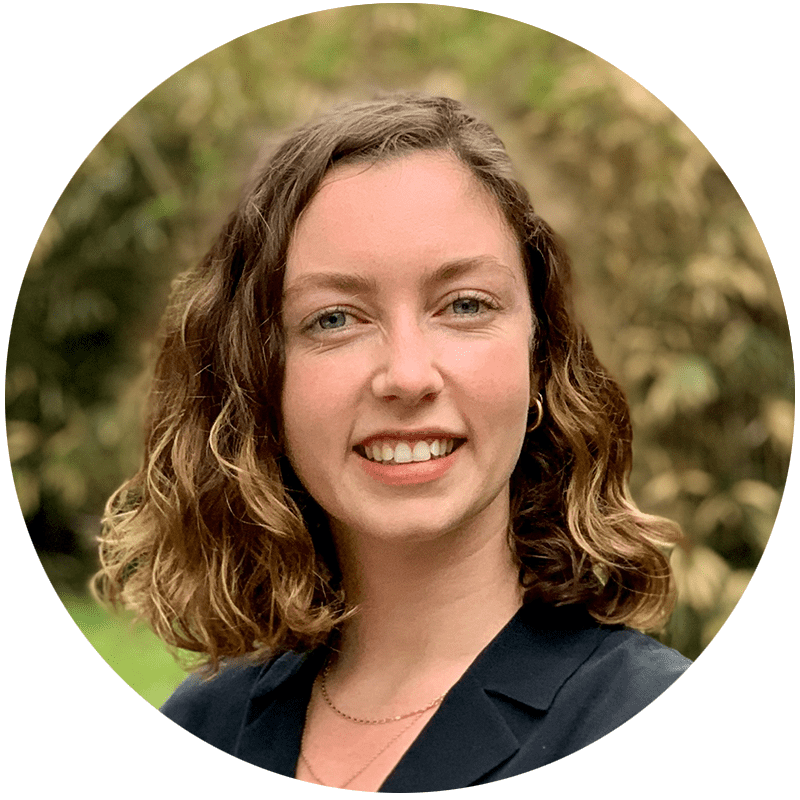
Bailey Clark served as the Communications Coordinator for World Relief Memphis. With a background in journalism and advertising, she is passionate about storytelling and its power to make a difference.

A pioneer in the documentation space, Emily Kankindi is the communications and documentation unit coordinator at World Relief in Rwanda. She started with World Relief in 2005 and has been growing through different stages while pursuing a career in creative communications with a passion to tell the story of impact. Driven by a mission to serve the most vulnerable, Emily is best known for inspiring others to care and serve the needy by using all possible means of communication to promote and call forth positive ramifications of WR interventions in all aspects of life. Her educational background is marketing and travel operations.
One Year Later: Erika’s Story
When Russia invaded Ukraine in February last year, Erika Symonenko was working as a salesperson for a garage door company. “I went to Germany right after the war started to help some of my family members [who had fled Ukraine].”
When she got back, however, she was desperate to do more.
Being Part of the Solution
“I couldn’t focus at my old job. I was not able to work. My co-workers understood that I will not be able to focus or do anything unless it’s involved with helping refugees… All I could do was check the news, and I knew that I shouldn’t, but I have to know what’s happening, so I kept checking the news and I want to help. The worst feeling is that you are safe when your friends and your church and your family are getting bombed. You’re feeling guilty. So it was a very depressing moment, and the first thing that comes to mind is the only way that you will be able to help is when they start coming here. So when people start coming here, World Relief is going to be the first to respond.”
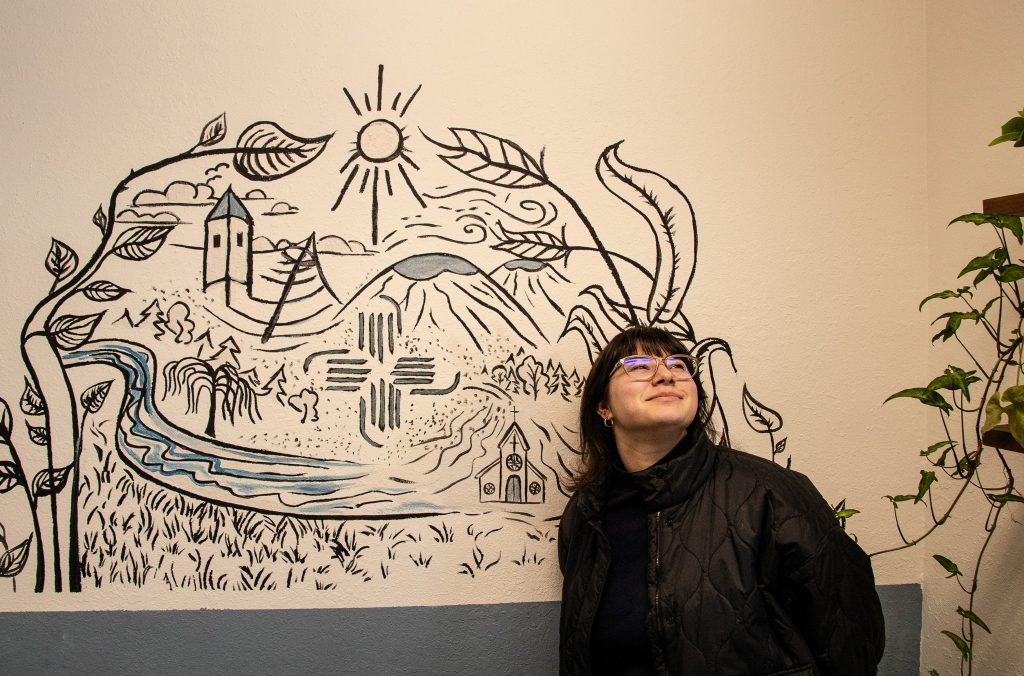
Erika decided she needed to get a job at World Relief. Her old employers offered her a raise to get her to stay. “They would have paid me more than I get here, but in the end, this is what I needed to do.” She started as the housing specialist in April of 2022 .
“The worst feeling is that you are safe when your friends and your church and your family are getting bombed.” – Erika
Immigration in 2008
Erika herself came to the US from Ukraine with her family in Summer 2008. Her story reflects the longstanding, complicated relationship between Russia and Ukraine.
Her family’s church, Irpin Bible Church, was very involved with the Orange Revolution in 2004, a peaceful revolution to protest the fraudulent presidential election in the same year when the Russian-backed candidate (Viktor Yanukovych) was awarded the presidency even though his opponent (Viktor Yushchenko) had received the majority of the vote. Irpin Bible Church, located only 20 miles from Kyiv, provided food, tents, coats, a place to sleep and other resources to the protestors.
“During the whole situation,” Erika said, “we would often be without light or heat because that would come from Russia. They would cut off our resources. We couldn’t do homework. We had to use candles.”
Yushchenko, whose campaign color was orange, was eventually awarded the presidency in a recount in early 2005.
“The protests of late 2004 initially succeeded in preventing Kremlin-backed candidate Viktor Yanukovych from stealing the Ukrainian presidency and made possible the election of his reformist rival, Viktor Yushchenko. However, Yushchenko soon found himself beset by infighting and was unable to lead Ukraine decisively towards Euro-Atlantic integration during what proved to be a hugely frustrating five-year term in office. This paved the way for Yanukovych to mount an unlikely comeback and win the 2010 presidential election race.” (Atlantic Council website)
Erika’s parents became very concerned about their children’s future. “They realized there will be no future for their children to build, and since it is so difficult to get an education and get it transferred to America, they decided they will move here (to the US) as soon as possible.”
Another significant factor in their decision to immigrate to the US was the fact that Erika’s youngest brother has cerebral palsy. “They had friends in Germany and several other countries, but America is the number one country for people with disabilities, so my parents decided it is best. There is so much he receives here that he would not have gotten in another other country.” (Erika’s brother is 21 now and attends Spokane Community College.)
A Rough Start
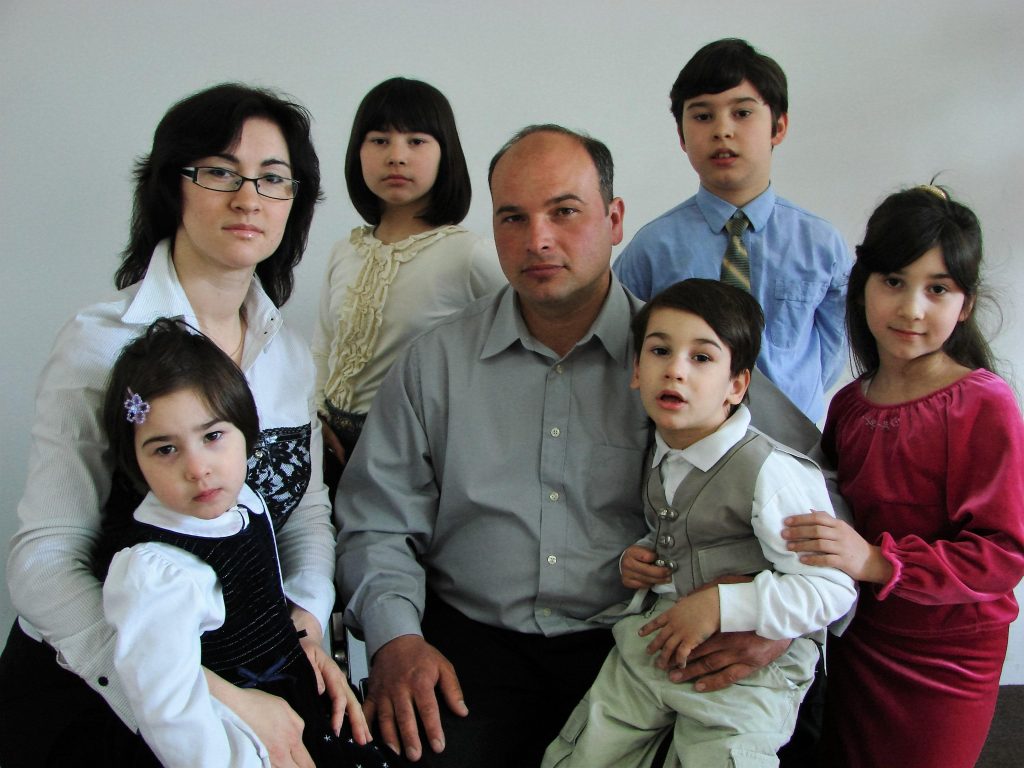
Erika was 11 when they arrived. “They put me in 7th grade because there was lots of confusion… They give me my class schedule, which I had no idea how to navigate, and for some reason, there was no one to go with me to the school, so they just randomly put me in class, and the lady who was supposed to help me navigate the first couple of days, she had her Spanish dictionary with her, and she kept pointing at it, and I would just ignore. And she thought that maybe I was just very traumatized or something, and I can’t respond, but within a couple of days, she realized that I just honestly have no idea what’s going on, and she got really upset and angry, and she kept pointing fiercely in the dictionary, trying to figure out when my birthday is and things like that, and why am I not putting my name at the beginning of the worksheet paper. Later, I found a Ukrainian boy, and I asked him to come up to her and tell her that I don’t speak Spanish, and even though I have dark hair and dark eyes, it doesn’t mean that I am Hispanic.
“We laughed a lot about that later, and now, it’s an ongoing joke, but it was very stressful at the moment.”
According to the Spokesman Review, before the war started, there were roughly 30,000 Ukrainian Americans in Spokane County, the vast majority “Christian refugees who immigrated to the U.S. to escape religious persecution.” A second article estimates 2,500 more have arrived since the war began.
New Arrivals
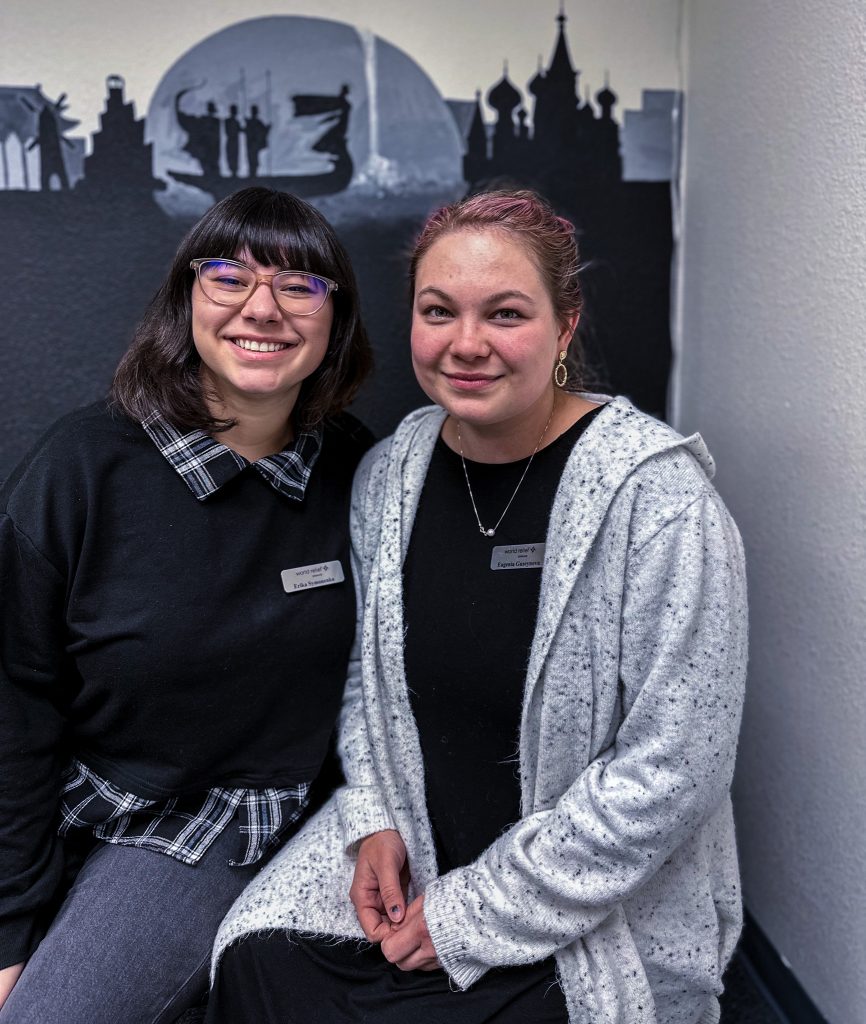
At World Relief, Russian-Americans and Ukrainian-Americans work side by side without conflict. Erika’s roommate, Eugenia (pictured right), is from Russia and also works at World Relief as the pre-arrival coordinator. She knows who is coming when and arranges for each new arrival to be greeted at the airport.
World Relief is able to help the newly arriving Ukrainians with job search, employment and housing stabilization.
“They are also coming here to get information and education,” Erika said, “because everyone when they hear the word ‘refugee’ in Spokane, the first thing that comes to mind is World Relief… Our signs says, ‘help the vulnerable,’ and they don’t have to be registered with World Relief to be vulnerable. Lots of Ukrainian families that come here, we refer them to resources, explain how to find housing, and in the Friendship Center, they have resources.”
Erika has also recruited her mom, Olga, to help as a translator.
“I always wanted to volunteer, but now, it’s time when you need help the most. I see the war in Ukraine; there’s lots of Ukrainian people. I’m trying to help them by myself, but I think it’s just better to join the community who’s doing it right now, and it might help even more.”
*This is what strikes us again and again, with refugees in general, but particularly with the crisis in Ukraine. The Ukrainians who came to the US before the invasion go out of their way to help those who have fled since – going to Mexico to help people cross into the US and register as parolees, taking on private sponsorship, going to Germany and Poland to help people fleeing Ukraine, providing food, water and other necessities to their countrymen as they wait at terminals and temporary shelters. Erika’s mother, Olga, and her sister, who lives in Germany, have been working together since the war broke out to get friends and family first to Germany and then to the US.
